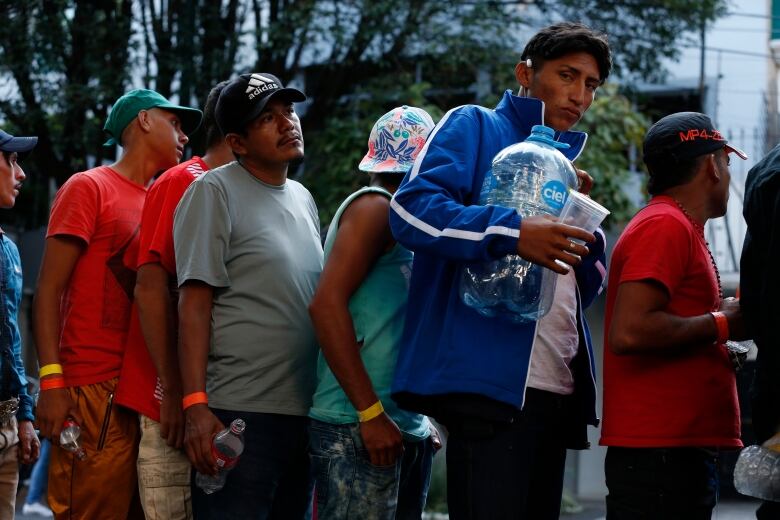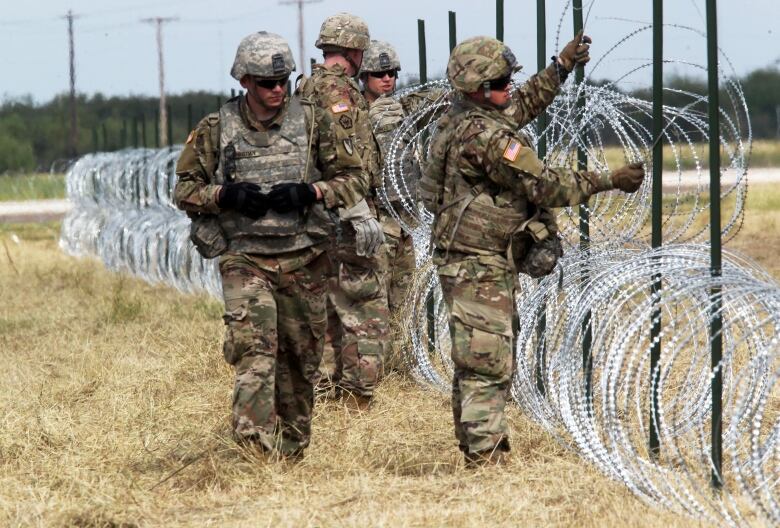Trump signs declaration to limit asylum protections for migrants
Order to funnel asylum seekers through official ports is immediately challenged in court

U.S. President Donald Trump on Friday invoked extraordinary national security powers to deny asylum to migrants who enter the country illegally, tightening the border as caravans of Central Americans slowly approach the United States.
Trump is using the same powers he employed to push through a version of the travel ban that was upheld by the Supreme Court, albeit on its third attempt after earlier versions were rejected by the courts. The proclamation puts into place regulations adopted Thursday that circumvent laws stating that anyone is eligible for asylum no matter how he or she enters the country.
"We need people in our country but they have to come in legally, and they have to have merit," Trump said Friday as he prepared to depart for Paris for the G20 summit.
The measures are meant to funnel asylum seekers through official border crossings for speedy rulings, officials said, instead of having them try to circumvent such crossings on the nearly 3,200-kilometre borderbetween the U.S. and Mexico.But the busy ports of entry already have long lines and waits, forcing immigration officials to tell some migrants to turn around and come back to make their claims.
The move was spurred in part by caravans of Central American migrants slowly moving north on foot but will apply to anyone caught crossing illegally, officials said Thursday. It's unknown whether those in the caravan, many fleeing violence in their homelands, plan to cross illegally.
Administration officials said those denied asylum under the proclamation may be eligible for similar forms of protection if they fear returning to their countries, though they would be subject to a tougher threshold. Those forms of protection include "withholding of removal" which is similar to asylum, but doesn't allow for green cards or bringing families or asylum under the United Nations Convention Against Torture.

The announcement was the latest push to enforce Trump's hardline stance on immigration through regulatory changes and presidential orders, bypassing Congress. But those efforts have been largely thwarted by legal challenges and, in the case of family separations this year, stymied by a global outcry that prompted Trump to scrap them.
Rights group move to declare order invalid
Trump's order denying asylum to migrants was challenged in the courts within hours.
A lawsuit in San Francisco federal court filed by the American Civil Liberties Union, Southern Poverty Law Centerand Center for Constitutional Rights seeks an injunction to prevent the administration from implementing the asylum policy.
The suit seeks to declare the regulations invalid and wants a judge to stop rules from going into effect while the litigation is pending.
BREAKING: Together with @ACLU & @splcenter we filed a federal lawsuit challenging the asylum ban proclamation signed this morning by Trump. The #AsylumBan is ILLEGAL and violates the Immigration and Nationality Act as well as the Administrative Procedure Act.
—@theCCR"The president is simply trying to run roughshod over Congress's decision to provide asylum to those in danger regardless of the manner of one's entry," said ACLU attorney Lee Gelernt.
It wasn't clear whether the case would go before a judge before the rules go into effect Saturday. The rules once enacted go into place for at least three months but could be extended, and they don't affect people already in the country.
Curbing immigration has been a signature issue for Trump, who pushed it hard in the days leading up to Tuesday's midterm elections, railing against the caravans that are still hundreds of kilometres from the border as an impending "invasion."
He has made little mention of the issue since the election but has sent troops to the border in response. As of Thursday, there are more than 5,600 U.S. troops deployed to the border mission, with about 550 actually working on the border in Texas. The military is expected to have the vast majority of the more than 7,000 troops planned for the mission deployed by Monday, and that number could grow.
It's not clear what their duties will be, as existing legislation prevents troops from interacting with migrants and acting in a law enforcement capacity.
About 70,000 people per year who enter the country illegally claim asylum, officials said.
The asylum section of the Immigration and Nationality Act says a migrant is allowed to make a claim up to a year after arriving in the U.S., and it doesn't matter how they arrive illegally or through a border crossing.

Migrants who cross illegally are generally arrested and often seek asylum or some other form of protection. Claims have spiked in recent years, and there is a backlog of more than 800,000 cases pending in immigration court, with a wait time that can be nearly two years.
Throttling migrant streams
Less than one-quarter of applicants from Central America were approved between 2012 and 2017, although it's not known how many stayed in the country despite a deportation order, or stayed without even attending a hearing. Trump's recently departed attorney general Jeff Session announced a policy change at his Justice Department to deny survivors of domestic abuse and gang violence asylum claims, which could further curtail the success rate.
Trump has long said those seeking asylum should come through legal ports of entry. But many migrants are unaware of that guidance, and official border crossings have grown clogged.
Officials have turned away asylum seekers at border crossings because of overcrowding, telling them to return later. Backlogs have become especially bad in recent months at crossings in California, Arizona and Texas, with some people waiting five weeks to try to claim asylum at San Diego's main crossing.
Activists have accused border officials of unduly using this "metering" approach.
In an ideal and predictable world, asylum seekers should present themselves at the border and request protection.However, the reality of refugee flight is complex and requires management in a structured way with dignified reception arrangements.- United Nations refugee agency
UNHCR, the United Nations refugee agency, urged the U.S. to continue to follow international protocols it agreed to in 1967 surrounding refugee protection and humanitarian assistance.
"In an ideal and predictable world, asylum seekers should present themselves at the border and request protection," the UNHCR said in a statement. "However, the reality of refugee flight is complex and requires management in a structured way with dignified reception arrangements."
Asylum seekers are making a "desperate choice," the UNHCR said, to use smugglers whose routes lead to irregular crossings.
Illegal crossings are down substantially
In 2017, the U.S. fielded more than 330,000 asylum claims, nearly double the number two years earlier and surpassing Germany as highest in the world.
While there has been a recent spike in asylum claims, the number of illegal crossings at the southern border is a fraction of the totals seen from the late 1980s through the early 2000s.
Secretary of State Mike Pompeo said in September the country would take no more than 30,000 refugees in a year. The U.S. took in approximately 200,000 refugees per year in 1980, and the total had never fallen below 70,000 before Trump entered office.
The administration has also looked to end protections under programs in which tens of thousands of people fromHonduras and El Salvador who entered the country after hurricanes and earthquakes devastated their countries near the beginning of the century. Those moves have been challenged in court.
Trump has also expressed an interest in ending birthright citizenship to those born to non-citizens and for ending the the so-called DACA protections for hundreds of thousands who've been in the U.S. for years but were brought into the country illegally while children.
It's unclear how many people en route to the U.S. in the current caravans will even make it to the border.
Similar caravans have gathered regularly over the years and have generally dwindled by the time they reach the U.S. border. Most have passed largely unnoticed.
With files from CBC News












_(720p).jpg)


 OFFICIAL HD MUSIC VIDEO.jpg)
.jpg)



























































































